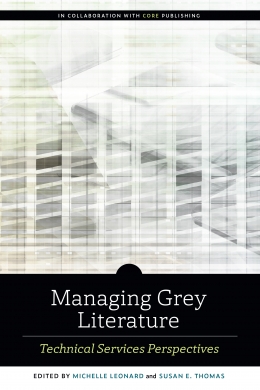Primary tabs
You don't need to be an ALA Member to purchase from the ALA Store, but you'll be asked to create an online account/profile during checkout to proceed. This Web Account is for both Members and non-Members. Note that your ALA Member discount will be applied at the final step of the checkout process.
If you are Tax-Exempt, please verify that your account is currently set up as exempt before placing your order, as our new fulfillment center will need current documentation. Learn how to verify here.
- Description
- Table of Contents
- About the authors
- Reviews
Using this guide, collection managers and acquisitions librarians, preservation librarians, catalogers, and library managers will understand how to utilize the technical services workflow to process and showcase this unique material.
An important resource for scholarly research, grey literature is relevant to every discipline. It’s also often more current than commercial publications. Unfortunately, though it provides a richness of content, this type of scholarly resource is often overlooked when conducting research. This book aims to change that, describing the importance of grey literature and offering a holistic approach to successfully integrating it into library collections. Readers will learn
- an overview of grey literature that discusses its importance to researchers, scholars, and students;
- collections policies for selection and deselection, complete with a suggested workflow;
- information about vendors, OA, and other aspects of acquisitions;
- guidance on cataloging, such as collection categories in the public-facing catalog, and preservation; and
- methods for promoting grey literature in library collections, including institutional repositories; and
- tips for marketing, branding, outreach, and best communication practices for colleagues, administrators, and patrons.
Preface
Chapter 1 Grey Literature: its Past, Present and Future, Leonid Pavlov
Chapter 2 Managing and Weeding the Grey Literature Collection, Hillary Fox and Cynthia Levine
Chapter 3 Ideas and Challenges in Cataloging Grey Literature, Rachel Berman Turner
Chapter 4 Persistent Identifiers and Grey Literature: A PID Project and GreyNet Use Case, Dominic Farace, Stefania Biagioni, Carlo Carlesi, Chris Baars
Chapter 5 Communicating the value of international grey literature: the Aquatic Sciences & Fisheries Abstracts (ASFA) experience, Tamsin Vicary, Maria Kalentsits, Florine Lim, Daryl Superio
Chapter 6 Impact of Digital Transformation on Grey Literature, Dobrica Savić
Contributors
Index
Michelle Leonard
Michelle Leonard is the assistant director for education and training programs at the University of Florida, Office of Research. From 2004–2021, she was tenured faculty in the Marston Science Library at the University of Florida where she was the librarian and collections liaison to multiple departments in agriculture and natural and environmental sciences. She is an avid advocate for the inclusion of grey literature in her information literary workshops at the undergraduate level, and for scholarly research at the graduate level. Michelle coauthored the book Implementing and Assessing Use Driven Acquisitions (2016) and coedited Assessment Strategies in Technical Services (2019). She has published and presented on collection management, assessment strategies in libraries, and the responsible conduct of research at national educational, and library conferences, and international conferences.
Susan E. Thomas
Susan E. Thomas is the interim dean of library services at Indiana University South Bend. Susan has thirty years of experience working in academic libraries. Prior to positions at IU South Bend, Susan has served as the facilitator for reference services and archivist at Valdosta State University (Georgia), the assistant head of the Regents Center Library and bibliographer for social welfare at the University of Kansas/Edwards Campus, and as a medical reference librarian at the University of Oklahoma Health Sciences Center Library. She is currently serving as the chair of the Core Publications Committee.
Core
The former Association for Library Collections and Technical Services (ALCTS), the Library Information Technology Association (LITA), and the Library Leadership and Management Association (LLAMA) are now Core: Leadership, Infrastructure, Futures, a new division of ALA. Its mission is to cultivate and amplify the collective expertise of library workers in core functions through community building, advocacy, and learning.
"Do not let the size of this book fool you, as its 128 pages are filled with a great deal of information ... I must admit that when I initially approached this book, collection management of grey literature was not high on my radar or so I thought, but as I proceeded through the book I began to think about what is going into our own university repository, materials in our archives and special collections, as well as some of the requests we are now receiving from students, faculty, and scholars doing research, much of which falls into the category of grey literature. As a librarian who has been working in collection management for more than 20 years, I recommend this book to others working in collection development and management, as well as those in technical services."
— Technicalities
"Awkwardly, and despite the work of organizations such as GreyNet International, there are no standardized approaches to describing, safekeeping and finding GL. This is the reason this book is so valuable ... Should you read it? Certainly. This field is only going to become more important. And it’s a pleasure to read. The editing is tight, the contents are engaging, the layout is helpful, there are notes and references throughout, plus a useful index. Who should read it? Anyone with an interest in the future of organized information, and that’s us."
— Journal of the Australian Library and Information Association
"Provides readers a thorough overview ... Any librarian who reads this informative book, regardless of the department in which they work (e.g., technical services, reference/instruction, etc.), will have a better understanding of what grey literature is and its importance to the work of scholars and researchers."
— Technical Services Quarterly



